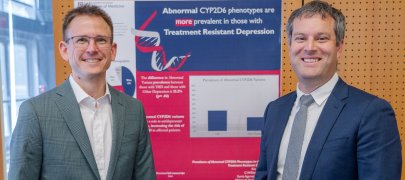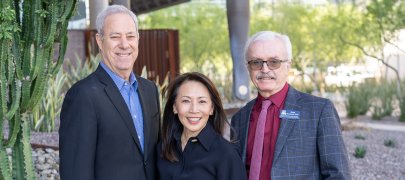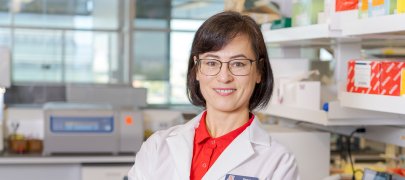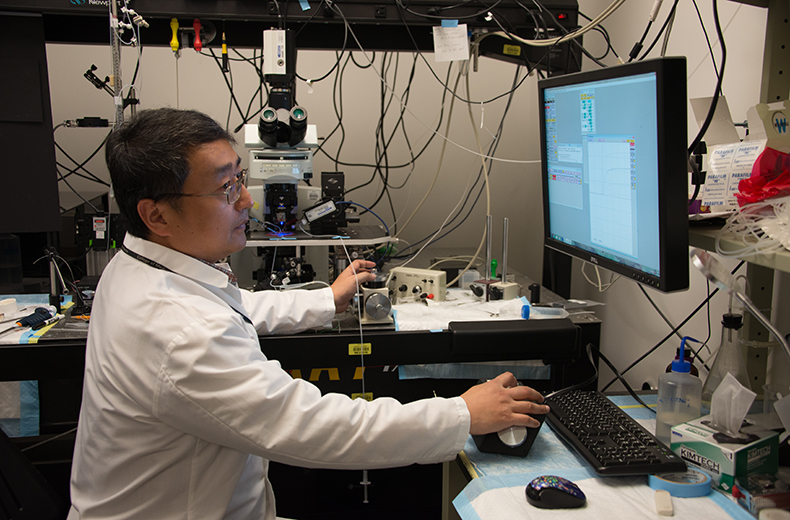
Faculty Spotlight: Shenfeng Qiu, MD, PhD

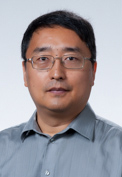 Shenfeng Qiu, MD, PhD, is an assistant professor in the department of Basic Medical Sciences at the UA College of Medicine – Phoenix.
Shenfeng Qiu, MD, PhD, is an assistant professor in the department of Basic Medical Sciences at the UA College of Medicine – Phoenix.
His research is on arguably the most complicated machinery — the human brain — and it all boils down to one thing: how the brain is formed and what goes awry in neurodevelopmental disorders, such as autism and schizophrenia. “Our brain is comprised of billions of neurons organized into different cells, circuits, regions — each one with a different function.” It is up to Dr. Qiu to identify how irregularities imposed by faulty genetic programs, often with the interplay of environmental factors, in those circuits may contribute to brain disease.
Education
Prior to his arrival in Arizona, Dr. Qiu attended medical school at Nanjing Medical University in China, where he received his MD; he then completed his PhD at the University of California, Riverside; and did lengthy post-doctoral work studying neurodevelopmental disorders at Vanderbilt University and the University of Southern California.
The Research
In the words of Dr. Qiu, “What I’m interested in looking at is the mechanism of brain development and how genetic risks lead to neurodevelopmental and neuropsychiatric conditions.” Yet because the brain is such a complicated network of intertwining communications, there are critical time windows during which this development can be affected. His work focuses on some common genetic variations and rare mutations and their correlation to autism.
Dr. Qiu understands the difficulty of that challenge, “If you wanted to study the hardcore mechanisms of a gene in brain development, you can only focus on one gene at a time.” Although there are hundreds of genes that have been determined to have an adverse effect on brain development, and ultimately may contribute to autism, his research focuses on one gene in particular — the MET.
MET’s influential and prominent role in the connection of brain regions makes it a leading candidate in understanding autism risk.
The Ultimate Goal
Through his research, Dr. Qiu aims to isolate the specific effects genes have at the molecular, cellular and circuit levels; moreover, how they then dictate specific connectivity and communications between neurons in the form of chemical synapse. From there, he hopes to trace the faulty developmental program and implement interventions to redress brain functions and behavior.
By understanding how these variations can affect the brain, they may be able to identify the risk of autism at a fundamental level; in addition, focusing on specific brain regions, circuits and cell types may lead to the discovery of ways to improve the overall function of those kids who are afflicted with it.
Dr. Qiu understands the immense challenges facing this community, “At the national level, 1 in 110 kids is diagnosed with autism. In Phoenix, it’s 1 in 64.” But by coming here, he’s optimistic he’ll be able to make a significant impact. He feels that is a goal that will only be aided by the UA College of Medicine – Phoenix — an institution with an expanding, supportive infrastructure and great expectations for future research.
Outside the Lab
Although a good bit of his time is spent in the lab, furthering his research, Dr. Qiu does enjoy his off-time with his family. He loves Phoenix and sees it as a place where he can truly make a difference.
Article By: Tom Kelly
About the College
Founded in 2007, the University of Arizona College of Medicine – Phoenix inspires and trains exemplary physicians, scientists and leaders to optimize health and health care in Arizona and beyond. By cultivating collaborative research locally and globally, the college accelerates discovery in a number of critical areas — including cancer, stroke, traumatic brain injury and cardiovascular disease. Championed as a student-centric campus, the college has graduated more than 800 physicians, all of whom received exceptional training from nine clinical partners and more than 2,700 diverse faculty members. As the anchor to the Phoenix Bioscience Core, which is projected to have an economic impact of $3.1 billion by 2025, the college prides itself on engaging with the community, fostering education, inclusion, access and advocacy.
